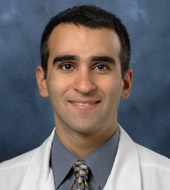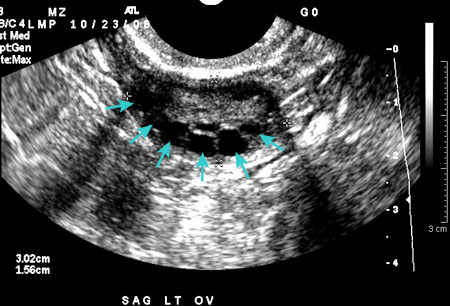Resumo
Definição
História e exame físico
Principais fatores diagnósticos
- presença de fatores de risco
- mulheres em idade fértil
- menstruação irregular
- infertilidade
- hirsutismo
Outros fatores diagnósticos
- acne
- sobrepeso ou obesidade
- hipertensão
- queda de cabelos
- pele oleosa ou sudorese excessiva
- acantose nigricans
Fatores de risco
- história familiar de síndrome do ovário policístico (SOPC)
- adrenarca prematura
- obesidade
- baixo peso ao nascer
- exposição do feto ao androgênio
- interferências endócrinas causadas pelo ambiente
Investigações diagnósticas
Primeiras investigações a serem solicitadas
- 17-hidroxiprogesterona sérica
- prolactina sérica
- hormônio estimulante da tireoide sérico
- teste oral de tolerância à glicose
- perfil lipídico em jejum
Investigações a serem consideradas
- testosterona sérica total e livre
- sulfato de desidroepiandrosterona sérico (DHEA-S)
- androstenediona sérica
- ultrassonografia pélvica
- hormônio antimülleriano sérico
- monitoramento da temperatura basal do corpo
- medição do progesterona na fase lútea
- LH e hormônio folículo-estimulante (FSH) séricos
- hemoglobina A1c ou glicemia de jejum
Algoritmo de tratamento
com infertilidade e fertilidade desejada
não desejam a fertilidade atualmente
Colaboradores
Autores
Mark O. Goodarzi, MD, PhD

Division of Endocrinology, Diabetes & Metabolism
Eris M. Field Chair in Diabetes Research
Professor of Medicine
Cedars-Sinai Medical Center
Los Angeles
CA
Declarações
MOG has been reimbursed for one-time participation in an advisory board for Nestle Health Science on the topic of exocrine pancreatic dysfunction. MOG is an author of a number of references cited in this topic.
Revisores
Antoni Duleba, MD
Professor
Department of Obstetrics and Gynecology
University of California Davis
Sacramento
CA
Declarações
AD declares that he has no competing interests.
Richard S. Legro, MD
Professor
Department of Obstetrics and Gynecology
Penn State Hershey College of Medicine
Hershey
PA
Declarações
RSL has been reimbursed by Serono for attending a medical conference and received a lecture fee, and has consulted for Ferring. He has received research funding from the NIH, the Commonwealth of Pennsylvania, and Parke Davis. He is an author of a number of references cited in this topic.
Cornelis B. (Nils) Lambalk, MD, PhD
Gynaecologist/Fertility Specialist
Division of Reproductive Medicine
Department of Obstetrics and Gynaecology
VU University Medical Centre
Amsterdam
The Netherlands
Declarações
CBL declares that he has no competing interests.
Créditos aos pareceristas
Os tópicos do BMJ Best Practice são constantemente atualizados, seguindo os desenvolvimentos das evidências e das diretrizes. Os pareceristas aqui listados revisaram o conteúdo pelo menos uma vez durante a história do tópico.
Declarações
As afiliações e declarações dos pareceristas referem--se ao momento da revisão.
Referências
Principais artigos
Azziz R, Carmina E, Chen Z, et al. Polycystic ovary syndrome. Nat Rev Dis Primers. 2016 Aug 11;2:16057. Resumo
Teede HJ, Tay CT, Laven JJE, et al. Recommendations from the 2023 international evidence-based guideline for the assessment and management of polycystic ovary syndrome. J Clin Endocrinol Metab. 2023 Sep 18;108(10):2447-69.Texto completo Resumo
Artigos de referência
Uma lista completa das fontes referenciadas neste tópico está disponível para os usuários com acesso total ao BMJ Best Practice.

Diagnósticos diferenciais
- Deficiência de 21-hidroxilase
- Disfunção tireoidiana
- Hiperprolactinemia
Mais Diagnósticos diferenciaisDiretrizes
- International evidence-based guideline for the assessment and management of polycystic ovary syndrome
- ACOG practice bulletin: polycystic ovary syndrome
Mais DiretrizesFolhetos informativos para os pacientes
Síndrome do ovário policístico: quais são as opções de tratamento?
Síndrome do ovário policístico: o que é?
Mais Folhetos informativos para os pacientesConectar-se ou assinar para acessar todo o BMJ Best Practice
O uso deste conteúdo está sujeito ao nosso aviso legal